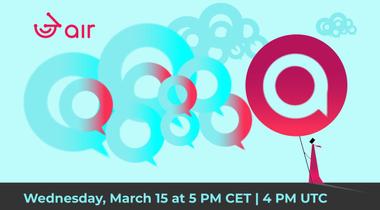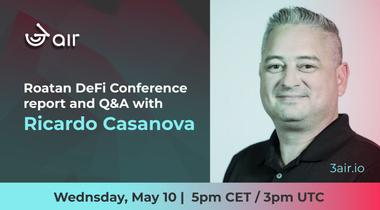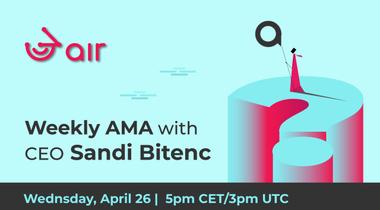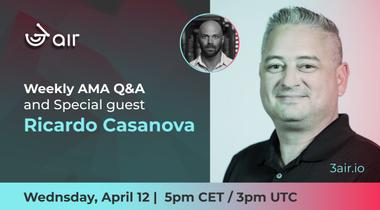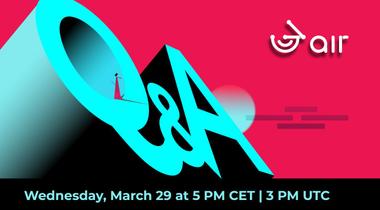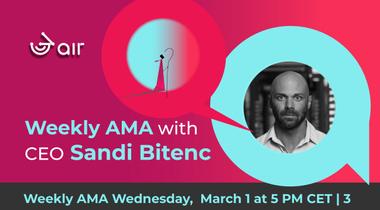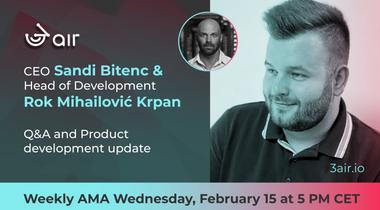Table Of Contents
This is a transcript from our weekly YouTube live AMA:
SPEAKERS: Anita Mlakar and Sandi Bitenc.
About AMA: On this AMA, we are giving you 3air update and Q&A.
AMA Duration: 59:46
Introduction:
Anita Mlakar: 00:22
Hello, everybody, we are back. It is Wednesday, it is 3air’s time for AMA. And I’m happy that you’re with us right now. I am looking forward to all of your questions coming up during our AMA. And of course, I would like to invite you also to be a part of our communities. We are on Telegram, on Twitter and on Discord, and, of course, to subscribe to this YouTube channel so that you will get notifications whenever we are going live. Welcome!
00:55
My name is Anita Mlakar. Maybe you already know that. But if you don’t, I am the host of these AMAs. And of course, Sandi Bitenc, the CEO of 3air will be joining us in a couple of seconds, maybe in a minute, because first, I would like to do a short introduction of what we are doing at 3air before we give you the opportunity to ask questions.
01:19
What are we doing? We are giving people of Africa internet connection, so connecting the unconnected. Unlike the advanced and developed countries, Africa is far behind when it comes to development. Africa has the lowest number of internet connections, only 22% of the continent has access. It also has the largest potential for progress and 3air has done extensive research. So, the growth potential in Africa and came up with Blockchain solution, broadband internet connectivity infused into the blockchain technology. It is really an amazing innovation. So once people have internet connections, once we provide African people with internet connection, we can also provide them with digital identities, then we can bank the unbanked, create an easy-to-use system for acquiring ISP services, provide micro loans to people in Africa, implement security and fraud prevention features, enable secondary markets for bandwidth and other subscription services and so on and so on.
02:30
3air is working on Africa and has the plan of going global and we were talking about it the last time in our AMA and of course we will continue this conversation today. So, I am happy to welcome and say hello to Sandi Bitenc, the CEO of 3air.
18:28
Hello, Sandi. Hey, Sandi, please do tell us where are you right now? And what are you doing? — [technical problem]
Sandi Bitenc, CEO of 3air joins the AMA:
Anita Mlakar: 19:02
We are back and we are live on our AMA. And we have our CEO with us. Hello, and welcome to our AMA.
Sandi Bitenc: 19:16
Hello.
Anita Mlakar: 19:18
I did ask you a question earlier, where are you? but we did not hear you. So, I explained later on that you are in Dubai and just for another day because you are going to Cairo to another conference. But right now, you are here. And this is of course also the opportunity for everyone to ask questions and to get some answers. But Sandi. The last time we were together we were talking about our roadmap about the fact that 3air is also going global, staying in Africa but going global with some project and what you promised is to tell us more about it today. And since now we have you live here and we can hear you so we are really looking forward to that.
3air Global Project Presentation:
Sandi Bitenc: 20:00
Yeah, okay, let me now try to get the presentation up and running. I had everything set up before, I guess I connected a new GoPro to it and it just messed everything up right now. That’s the main issue. But I will need to still put this one on I think. Let’s hope we don’t get an echo again. Share my screen okay, can you see my screen now?
Anita Mlakar: 20:42
Yes.
Sandi Bitenc: 20:43
Okay, so this is about, what I was talking before. So, 3air global, we are having now the tagline permissionless mobile services for your community. And I don’t know how much I told you the last time but what we’re trying to do is actually to enable everyone to become a mobile operator. This is what the 3air global currently is about.
21:11
Just to explain in a bit why we are doing this right now at this moment in time. We ae right now fighting a lot of wars on the regulatory side. So, we are still waiting for some licenses from DRC. So, this is where we are stuck currently with our current project. And 3air global was always on the roadmap, something that we really wanted to do. We thought that doing the Africa part is far more important, far more impactful, because it’s giving actually the connectivity to somebody who doesn’t have it, or who has really bad connectivity. And 3air global is not so much focused on changing really those lives, but it’s about making some life easier, you know, some things easier for everyone.
22:03
So, for the global communities, it does aim to decentralize and take maybe a bit centralized power away from the big telcos, trying to disrupt that part of it. This is why we are pulling this up front. We are trying to do this in the best way possible. I can say I’m really satisfied with how things are currently developing. I’ll tell you a bit more during this short presentation.
22:41
So just first, so you understand a bit what we’re trying to do, you need to understand how the current Telecom, mobile structure actually is set up. So, on the one side, you have here, the MNO. So those are the mobile network operators, they have set up and own the actual towers. So, the physical infrastructure is actually there. So, there are only a handful of those companies globally. Then you have the virtual mobile operators. So, the MVNEs, and the MVNEs are actually also operators, they’ll offer you a SIM card with their name and everything but they don’t own the infrastructure. They just leased the infrastructure; they use the infrastructure from the MNOs.
23:33
The first and most known MVNO is Virgin Mobile. So, they actually started this concept, this model, and since then, it’s been quite successful. Let’s say it like this, there’s I think a bit over 1000 MVNEs out right now. And they usually just focus on some niches or they have some bigger communities that they can sell their services to. This model was usually just directly MNO MVNO, this one we’re looking at. Those are usually direct connections. But there are two other models that are popping up lately. And one is the Virtual Mobile Network Enabler. So, the enabler is the one that is providing the software for the MVNOs to operate. And the MVNA, is actually the aggregator and this is the one that is connecting and doing mostly the contracts between MNOs and MVNOs.
24:48
So, what we’re trying to do with 3air is to actually tokenize this MVNA part and run the MVNEs on chain. So, these are what our blockchain should do and also of course, 3air should also be its own MVNO. So, its own mobile virtual network operator. So also offering SIM cards directly.
25:16
What are the problems that we are trying to solve? On the customer side, roaming is still really expensive. If you travel a lot, I know kind of, the first thing when I land somewhere in a new country, the first thing I’ll go is to go look for a SIM card because just turning your phone on sometimes will bring about charges. And it’s so hard to really understand how much you’ll be paying. When you’re roaming. Unless you’re in the EU, where the governments actually forced the telcos to actually have standard rates, wherever you go outside, it’s just a total mess, you usually really don’t know what you’re going to pay, and especially the data is really expensive. So, this is what we’re trying to solve with our SIM card.
26:16
On the other side, just think about it when you’re paying for your mobile service, for your mobile plan, you’re usually just buying a lot of internet and a lot of minutes and sometimes even unlimited minutes, and so on. And then you really use just a tiny fraction of that. This is actually called breakage, so the number of services that you actually bought on a monthly basis, and you don’t use that breakage, and that’s where telcos made their money, most of their money on. Usually, the plans are done like this, they will always be a lot of breakage, on either on the calling side, on the minute side or on the data plans. And this is also what we are intending to solve. I’ll tell you a bit more later when we are talking about the tokenization.
27:14
On the service provider side, it’s not so easy to become a virtual mobile operator. I don’t think that a lot of people who also have some bigger communities or some smaller communities are thinking about becoming their own telcos. Why not? because it’s hard, it’s a really big problem. Some investment is needed and that’s not negligible. The big problem is actually the regulatory side. So having all the contracts and enforcing everything, knowing in each jurisdiction that you operate in what kind of regulatory framework there is, and the requirements. So, these are actually the biggest challenges.
27:59
There are also some challenges still going on with fraud, especially when there’s roaming, and a lot of customer support. Customer Support is a really big cost driver for telcos and also we’re getting really good when we’re talking about that everyone has some breakage there. That’s on the consumer side, but also on the provider side, it’s really hard to get accurate pricing. It’s not so easy to actually price your services optimally.
28:35
So how do we go about solving this? Creating a permissionless layer one blockchain that will have this regulatory perspective that I was talking about actually integrated on chain. So, this means that when you’re using the chain and creating your own MVNO. You don’t need to think about compliance because we know what needs to be done and we can ensure that this compliance is actually held at the level of the end user, or he doesn’t get the service. The operator actually doesn’t need to think about it. So, this is the biggest burden and the biggest challenge in becoming an operator we’re taking away. And of course, also, because it’s permissionless and how it’s set up. It also doesn’t require a lot of capital investments. So, if you want to go deeper, you maybe need to have some developers that will help you create exactly the type of the service that you want to provide and also innovate on that. We will we’re tend to keep this open enough but if you don’t want to do this, it should be a let’s say one click solution.
29:55
We also want to integrate the data tokenization and so everything that comes in from the contracts with the MNOs and other MVNOs is going to get tokenized and then sold its tokens, and you will be able to buy these tokens, hold them in your wallet and actually approve for your session of a call or something like that you will actually approve spending of those tokens. So, when you’re calling or you’re using any data, those tokens will get automatically burned, but they’ll be burned only from a specific wallet and this is also why we need our own layer one because this is one special solution that we will need. If we want to make things easy for the end user, right? It needs to be easy. If you need to do a call, or browse the internet and you need to kind of confirm transactions to work. People won’t do it; they don’t get adaption. So, this is what we are looking for, to really abstract away. So that’s how it should work.
31:04
The data tokenization is how it’s working. It creates the opportunity for secondary markets. So, the tokens, they come from the actual network operators, so from the actual telcos and those telcos then provide the tokens to the system and they can get, bought and sold. So, the secondary market determines the actual price and this should, in theory, bring about optimal pricing for everyone involved.
31:45
On one side, the telcos will be able to sell all of their bandwidth and on the other side, the users will be able to actually get fair pricing for the tokens, because the secondary market will determine what the what the fair pricing is, what how much are the consumers actually willing to pay for this. So that’s about the secondary markets and it will also allow everyone to just pay how much they want to use. So, there is no packages, everything is kind of, pay as you go. With optimal pricing, you don’t need to think about buying up bigger amounts of minutes or data upfront, because everything is done through the token. Of course, also, because things are on chain, it’s less possibility of some fraud happening and if there’s less fraud, then there’s less customer support and if things are transparent on chain, it’s less customer support and can be easier, automated and everything. So that’s kind of the solution.
33:01
Why we think that this is right now the right time to implement something like this? There is you know, the telcos are kind of really old giants, and they’re constantly looking for new income and it’s not easy to get new customers and user customer acquisition costs are really high because everyone knows they need a mobile phone. Right? It’s not something, you don’t have a new market where you could source new people from. They literally need to steal the users from themselves. And of course, consumers are also constantly searching for better opportunities for better packages and for better roaming services. For them, for the most part, the pricing is the most important thing. But I will also argue that if we have strong communities, that are communities in the first place, not telcos in the first place, then you have better brand association and it’s easier for people to stick with an operator if it’s actually the operator from a community that they actually like.
33:12
That’s market sizing, of course, the opportunities are huge. We all know that the telco opportunity is huge. This is actually just a small part of the telecom token revenue, and of course, also the blockchain market size is also so both are really lucrative markets currently.
34:46
The business model is we’ll be running our layer one blockchain and we’ll be earning the transaction gas fees and also we’ll be having a markup on the telecom services. So how will this look like? What is the actual roadmap that we envision to actually start implementing this?
35:09
At stage one, and we need to take this in stages, of course, it’s a huge undertaking, what we’re trying to do. So, stage one would be really acquiring an MVNO license with a global roaming agreement. So, this would be only one country, as the base and all the other countries would it’s a roaming agreement. And, of course, when we have this, we can start selling, e-sims with data packages. And this at first stage, it won’t be even connected to the blockchain, per se. Some things will be, we’re also creating an ecosystem of nodes that will allow to become validators on our layer one. And we’re right now thinking about how to actually bring those nodes, the values of those nodes to our existing community and to our existing token holders. So, we’re really trying to figure a sustainable and really good and legal model in particular.
36:21
We’re also talking with some really cool projects, one in particular that will allow us to, in a sense, write our own regulatory framework. So, we’ve been invited actually to help write a regulatory framework for telcos. So, for startups, and this is something pretty amazing. I think it will help us getting traction and actually having less problems along the way. So, this is why I think having really good legal support is really important and we’ve seen this what’s actually happening right now in DRC.
37:10
Then in stage two, we want to deploy the nodes and when we had the notes deployed, I think we’ll do the E-SIM cards as NFTs. That’s not 100% sure yet, if we’ll do that but this will also allow us to earn start earning the gas fees and running our blockchain.
37:37
Then stage three is actually the expansion stage, we should then go to different jurisdiction and start becoming MVNOs in different countries, this should lowered and also the prices for the end users, and also bring about then exponential growth.
37:59
On stage four we’re doing then that data tokenization and also integrating some IoT.
38:06
In stage five, we are allowing the other communities to actually becoming a virtual mobile operators themselves permissionless, from our blockchain.
38:24
On stage six, and that’s far away, is actually becoming our own MNO. This means that we would start running our own physical infrastructure, but guided through the community and built with the community, and actually the community becoming the owner of the physical infrastructure. Of course, having all the benefits that come with that. That’s kind of the idea behind it. Currently, we are finalizing the white paper still, I think the White Paper could be finished by the end of next week, or at least the first final draft can be finalized by then.
What about competitors?
Anita Mlakar: 39:16
Sandi, thank you very much. This was really interesting and you give us really a full insight of what 3air is doing right now. I have a question maybe just regarding to competition and everything else. Roaming like you said is really a problem wherever we go. We have problem with that. Like you said, just trying to find out where we can go through all find the cheapest way to do roaming in foreign countries, but you are stepping into let’s say, maybe someone else’s territory with this idea because like you said, there are no prices, everyone could just name their own price and this will be now sort of arranged. Do you see any problems with that, let’s say competitors, or people that are already in this business?
Sandi Bitenc: 40:20
I know quite a lot of how these things are done and it’s not nice. They literally don’t care but I think we’ll have a lot of support in the beginning. I think usually how telcos would support something like that, usually, just to see how it works and then once they see it works, they’ll just try to buy it up. So that’s kind of the usual scenario and they cannot buy it, then they’ll try to stop it. Yes, we are thinking about that. We have a few experienced people in that are running MVNOs for, I think, over around 15 years, something like that. So really successful MVNOs in the past. So, they do know what competition means. We are preparing for that. Actually, the regulatory framework that I mentioned, should grant us some additional licenses that’ll make it harder for competition to actually totally block us out.
How long it would take to start the first stage? And how long it would take to come to the last stage?
Anita Mlakar: 41:36
Okay. Now, you went through all the stages, you’re represented to us. What do you think when could this first stage start? And how long would it take to actually complete it to come to the last stage?
Sandi Bitenc: 41:57
Yeah, so currently, as I said, we are finalizing the white paper, there are a few things still that we need to figure out. In the meantime, we’re also doing some fundraising and to have this setup as an MVP, we need around a million of funding. And we have currently around 370k of commitments, but it’s always like there is interest, there is a lot of interest, but there’s always questions about how it will work. We need to have a really strong white paper. I think then we’ll get in the million, but it is hard right now. So, in the crypto space currently, with everything that’s going on, it’s harder and harder to get the really good capital in. So, let’s see, I am confident that we can get this together. And as I said, so 370k has been committed, this doesn’t mean that we have the money, we don’t have the money yet. So, we need to get to the full million before the commitments actually come in. So, if we cannot show that we have everything that we need to actually pull the first stage off with the MVP, then yeah, we’re not getting this money. So just to make it clear that, that commitment doesn’t mean that we have the money. The MVP will actually consist of our SIM card that we will be issuing and the first set of node validators.
In which parts of the world or in which countries could this be done?
Anita Mlakar: 43:40
In which parts of the world or in which countries could this be done?
Sandi Bitenc: 43:47
I’ll not tell you which country we are actually talking to right now but it is in let’s say they’re around Latin Central America part.
Who is in the team behind the idea, beside Sandi?
Anita Mlakar: 44:00
Okay, interesting. This is really something great coming up. Who is the team behind the idea Sandi, besides you?
Sandi Bitenc: 44:09
So, we have some guys joining us from some different crypto project, high level crypto projects that have been doing their own layer one and nodes and so on. And on the telco side, we have two guys joining with both of them over 10 years of experience in the telco side. So, one was actually running three big MVNOs in Australia. And the other one is actually from Canada. He just recently sold his telco startup. Successfully exited and he’s now looking for some new opportunities and challenges, and let’s see, I think at least one of them, I can pull on our AMA. Maybe next time, or let’s say two times, I need to speak to him, and I’m just overstepping it. I need to speak to him and ask him if he wants to join.
With this new project, how the projects in Africa would be affected? How will there be the development going?
Anita Mlakar: 45:25
It’s great to see, you know, so enthusiastic about this. Sandi, what does that mean? You know, with this new project, what does that mean for the projects in Africa? How will there be the development going?
Sandi Bitenc: 45:43
In Africa, currently, Africa is on hold. I need to say Africa is on hold until we get the license until and it is frustrating. It’s really frustrating for me, for the whole team. Everything was set, and we should have gotten this license a few months back, and it’s still not there. It’s always promised, it will be tomorrow and tomorrow and tomorrow but it’s unfortunately, it’s still not there.
With the recent crisis of developing banks, is 3air affected in any way?
Anita Mlakar: 46:16
Okay, so we’re having our fingers crossed that it works. James was asking you a question in our community on Telegram, is 3air in any way affected by developing banking crisis?
Sandi Bitenc: 46:32
Well, not directly, we didn’t have any funds on Silicon Valley Bank and either way that was actually resolved recently. As SVB, kind of the US government is guaranteeing for all the depositors. So, from that side, we are not affected at all. But of course, because of all those things, where we are affected it’s getting harder and harder to really get funding in. Fundraising is becoming really hard. Also, wherever we go now, and it’s a lot of regulatory pressures. It’s a lot of regulatory pressures. Also, on the token side making token not to be a security, it’s really important, as we seen with the lawsuits that are coming up, and the US claiming that even Ether might be a security, it’s going to be really hard, I think, for all the crypto projects. So, this is what we’re also trying to solve a bit. Right now, to make it 100%, no security. I think we found a way. we found a really smart way how to do this through the nodes.
Market update:
Anita Mlakar: 47:53
Okay, that was a little bit of market update. Is something else right now, going on in the markets?
Sandi Bitenc: 48:05
I’m just really surprised how well the crypto market is holding up, I expected it to crash down but it was just exploding. Of course, we know why it was exploding but I don’t know why it was exploding so much. So, when I saw that the regulators are actually going after crypto from the US regulators. They literally in one week, they destroyed all three crypto banks, all three crypto friendly banks. SVB just collapsed, because they did some mistakes in investing their assets. But of course, they invested in long term assets, they didn’t expect the Fed to raise interest rates so quickly as they did in the last year and also beginning of this year. So, this is what actually made the bonds that they invested in the 10-year bonds actually worth almost 30-40% less. So, this was where they couldn’t pay out the depositors when the bank run came. So that was the big problem with Silicon Valley Bank.
49:18
Then we got Signature Bank that just closed and also Silvergate closed down. So, it was a coordinated attack however. I don’t see it any way else. It was a coordinated attack to actually get all the banking system cut away from crypto. And also, the officials actually published some warning for the banks to not hold crypto and so on. So, it’s really hard for, especially for the institutions to right now get money into crypto. This is where I was really skeptical, I was really expecting the market to actually crash but it didn’t happen. It crashed a bit; it went down to just 20-21k or something like that. And then it just shot up, like crazy. So, this is actually the biggest thing.
50:17
The other thing is also attack on the stable coins as we’ve seen BUSD has been attacked and cease operating. We also saw USDC de-packing. I don’t know if that was kind of, a bit of the intention. I don’t think so it was just some collateral damage happening from as SVB going down, because circle that is issuing USDC actually had, I think, around 10% of its assets blocked there. So, those all those things have resolved right now, except for the thing that the institutions do in the US cannot find banking, but I think we are right now getting a bit better regulation and a bit better support from the governments on the other side. on the Asian side. I think this is more or less pumping to markets.
51:19
What was pumping the markets? All the markets have been pumping, because it’s funny, when something breaks in the system as it did break for the banking system in the US, everyone is just starting to deploy money because everyone is expecting the Fed to not raise rates anymore. So, we went from 75 basis point. That was predicted for next week’s rate, hike down to 50 and now we are on 25. And some are even saying that there’ll be no more rate hikes at all. I do think we are one two times; we’ll see still maybe 125 or 225 rate hikes. And yeah, that’s why the markets were pumping, and especially after the banks broke down. And then we also got some good numbers, inflation numbers coming out on Tuesday.
How much funding and time is needed for building a layer one blockchain? How does this combined with SKALE?
Anita Mlakar: 52:19
Sandi, we have some questions from Richard, how much funding and time is needed for building a layer one blockchain? How does this combined with SKALE?
Sandi Bitenc: 52:34
Yeah, first of all, we are looking to create an MVP. So, an MVP isn’t that hard to do. Of course, for everything that we plan to do, yeah, it’s gonna go into millions. But this is what we are gonna raise once we have a working MVP. With a working MVP, I know where I can get enough funding to actually make this work. But for the MVP, I don’t think we need more than a million to actually work. Because you can now even build a blockchain with just using some SDK and so on, or you can just use a fork or anything like that. There’s a lot of things that are public, and just free for everyone to use. From that side, yeah, I’m pretty sure we can get this done with a million.
What will happen if 3air DRC permits will not be given?
Anita Mlakar: 53:42
Okay. What will happen if DRC permits will not be given?
Sandi Bitenc: 53:52
What will happen? We didn’t lay out a plan B, out for that. So that was kind of not an option, but we’ll probably start focusing more on 100% on 3air global, and raising some additional capital and then we’ll look into Ethiopia, or start building out maybe potentially, yes, Sierra Leone. But we need some testing ground where we don’t have live users that are used to something already, so we don’t want to risk the users there.
Are the revenues from Sierra Leone go to K3 only or also bit towards 3air?
Anita Mlakar: 54:36
Okay. Are the revenues from Sierra Leone go to K3 only or also bit towards 3air?
Sandi Bitenc: 54:48
They go only to K3. 3air didn’t do anything in Sierra Leone currently. Those are all the users that are actually from K3. So, until we are actually integrate something from 3air directly with the K3 users, we’re not going to get any revenue from there.
What are your plans for next 14 days?
Anita Mlakar: 55:08
Okay. Sandi, what will be the steps in let’s say the next 14 days when we will be away not being able to be on our AMA. What will be happening?
Sandi Bitenc: 55:24
We are currently really focused on finalizing all the paperwork that we need. Besides that, we are also on the lookout for fundraising. But the real fundraising will actually begin once we have all the paperwork done. Right now, we are more or less just around the people that we know, the VCs that we know, I’ll be talking to them. And seeing you know, if they like the idea, and if they would be willing to fund it. Once we have this, then we can actually see if we can get the funding in.
What’s happening in Cario?
Anita Mlakar: 56:03
You are leaving for Cairo tomorrow, what will be happening there?
Sandi Bitenc: 56:10
You know what, I’ll be moderating my first panel, I was invited to speak at a conference at a big tech conference there. It’s called Rise Up and it was postponed actually three times. So now in the third time, I think it will be successful. The moderator that was planned, he can’t make it. So, it looks like I’ll be moderating the panel.
Anita Mlakar: 56:37
That is great Sandi, this is a great role.
Sandi Bitenc: 56:41
I need some advice from your side on how to do it.
Anita Mlakar: 56:46
No problem. This is a very interesting role being on the other side because you’re always answering the questions now you will be the one asking others and of course I’m sure also giving all your opinion and I’m so sorry that I can’t be there to see you.
57:19
Sandi, with all the technical problems that we had we’re now okay. We really had a great image there with so much information and also answering some questions that have been put into our comment section and so thank you very much Sandi for this update. It is very important that everyone who is in our community and also involved with 3air gets information about what is going on and this was really great with all the presentation and everything and I’m sure that there will be some questions coming up also on our channels and Telegram specially so I know that you will be also be answering them there but in two weeks we are back here on our regular AMA giving of course new information. I wish you all the best Sandi.
Sandi Bitenc: 58:16
Thank you!
Anita Mlakar: 58:17
Have a great time in Egypt and just be great at the new role that you will be playing there.
Sandi Bitenc: 58:35
I don’t know if it’s going to be recorded or not. But I’ll try to record it and maybe, you know what? I don’t even know what the panel is about yet. For sure, I know it’s gonna be blockchain but I don’t actually know the actual topic.
Anita Mlakar: 58:53
So, the first rule is to know the topic to get prepared. This is the first rule but it is so much better if it is a subject that you are familiar with and it’s your subject that you’re connected. So, I don’t see any problems there but still find out what the talk will be about. Okay.
Sandi Bitenc: 59:15
Yeah, I asked already, didn’t get the answer yet.
Anita Mlakar: 59:17
Okay. They’re not serious. Tell them you are not taking this seriously because I need the information. Thank you, Sandi. Thank you for being with us. And thanks, everybody, of course that you are here with us asking questions, getting involved with the project. And of course, we’re looking forward to have you back here in 14 days. Bye everybody. Sandi also to you, bye.

